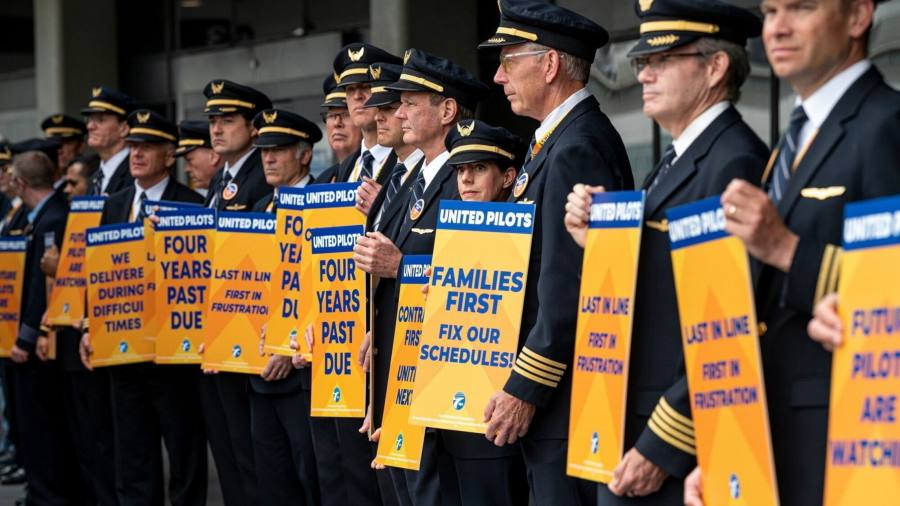Winning a lucrative promotion to captain might seem like an easy choice for an airline pilot. But at United Airlines, members of the pilots’ labour union engaged in drawn-out contract talks say the higher pay and status that come with the rank are not worth the personal cost.
Captains share cockpits with first officers, the second-in-command pilots who assist them with navigation and scheduling. But more first officers are reluctant to become captains because it could require longer flying assignments on short notice and more hours on call, union officials say.
“The pandemic changed the way a lot of workers feel about work-life balance, and it certainly took place with our pilot group,” said Garth Thompson, a captain and chair of the United unit of the Air Line Pilots Association union. “It’s going to start snowballing and affect the company’s pretty aggressive growth plans.”
The quality-of-life concerns are wrapped up in negotiations between United, one of the largest US airlines, and its pilots’ union. They reflect a broader shift in the pandemic as workers seek better working conditions in addition to higher pay.
United has 5,900 captains and 7,500 first officers flying planes, according to Thompson. A first officer who has flown wide-body jets at the airline for six years makes about $210,000 a year, while a captain flying narrow-bodies for six years would earn about 22 per cent more if they fly the same number of hours, according to aviation consultant Kit Darby.
Yet rising from senior first officer to junior captain entails sacrificing some control over when and where they fly, pilots say. For some, the pay improvement is not worth the added disruption to their home life.
Quincy Fleming, a United first officer who flies Boeing 777s out of San Francisco, said a promotion to captain would make it more likely that she would be denied some holiday requests and be forced to fly on a day off.
“What I’m reluctant to do is put myself back in the bottom of any seniority pile at this point in my life,” Fleming said. “I’ve got ageing parents. I’ve got school-aged kids.”
United plans to add 470 aircraft in the coming years. Joseph Rohlena, a Fitch Ratings analyst, said that United had historically not struggled to fill its captain ranks. He dismissed any threats from a captain shortage to the airline’s growth, saying that it would be able to “source pilots [so] that they can grow to the extent that they’re planning to”.
Contract negotiations with United’s pilots began in 2019, and the membership voted against a proposed contract in November by 94 per cent to 6 per cent. Among the union’s priorities are rules giving on-call pilots more time to arrive at airports and relieving them of being forced to wait at airports on standby service, in addition to a pay boost.
United said it continued “to work with the Air Line Pilots Association on the industry-leading deal we have put on the table”.
Concerns over scheduling and workplace conditions have been at the centre of the surge in union activity since the start of the Covid-19 crisis. A labour shortage has empowered unions to demand better working conditions, in addition to higher wages, from employers.
Freight railway workers nearly went on strike last year over attendance policies that required them to come to work with as little as 90 minutes’ notice, and penalised sick days. Hospital administrators were forced to recruit more nurses after 7,000 in New York City walked out in January, citing burnout from heavy patient loads.
“Workers want some degree of control over their time, and then they want better wages and benefits,” said Rebecca Givan, a labour relations professor at Rutgers university.
The heavily unionised airline industry typically engages in pattern bargaining for pilots, where standards for pay and working conditions established at one carrier set the standard for the rest. The pilots at Delta Air Lines ratified a contract in March that, in addition to a pay rise of 34 per cent over four years, partly limited the airline’s ability to assign some pilots to longer trips.
At American Airlines, pilots reached an agreement in principle on Friday after four years of negotiations. The deal included pay to at least match Delta’s, as well as scheduling improvements, said Dennis Tajer, an American captain and spokesman for the Allied Pilots Association.
American’s pilots wanted to limit the number of four- and five-day trips they were assigned because they dislike being away from their families. In the past, trips were shorter, but scheduling software introduced since 2020 has increased the number of long assignments. The hours pilots fly monthly has risen from about 75 per month to 85 or more, Tajer said.
“This meets the new standard, not only for compensation, but also, almost more importantly, for work-life balance,” he said.
At United, first officer John Young said he was reluctant to jump to the captain’s seat because the move might disrupt his work-life balance. He said the move was likely to leave him with more time on call, with just two and a half hours to report to work.
“Unless you’re right next door to the airport, you’re sitting there with your shoes on,” he said. “You burn people out.”
Read the full article here




